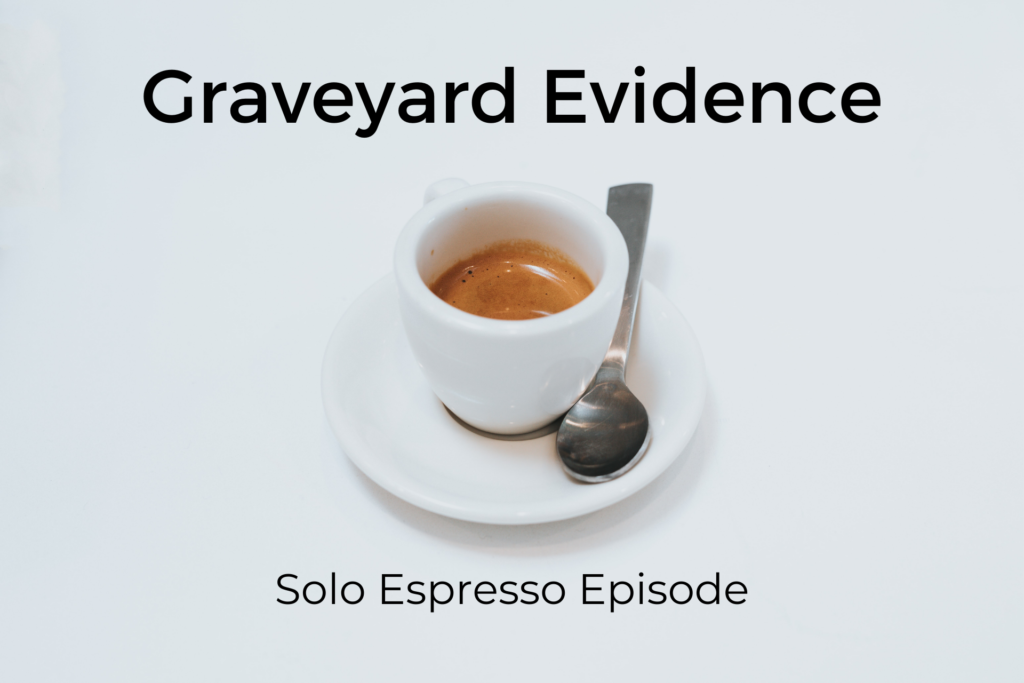Show Notes:
- Survivor bias
- If you’re good enough to get in, don’t go?
- Dying by your trousers
- The case of the dog in the night
- Horror and what’s wrong with this picture?
- Where to armour a WW2 plane
- WYSIATI
Transcript
Welcome to the dealing with Goliath podcast. I’m your host, Al McBride. And this is a solo episode, if you’re new to Goliath podcast, could be a good idea to dip back to episode zero to give you an idea of the different formats. And what we’re all about. This episode is called graveyard evidence.So this is one of these things I was reminded about the other day, particularly when I was growing up, and smoking was starting to be more and more officially bad for you, you know, people used to come out with these quite ridiculous statements. Like, you know, oh my granny, smoke 60 Marlboro a day and she lived to be 98 years old. You know, the type of point that certain people make. Nowadays, you know, you probably hear that a lot less but you still have the same Same type of thinking going on. And it’s a bit of a cognitive trap. Thinking errors, cognitive biases might be one of those things that I’ll come back to again, and because we have a lot of them, as humans, we make a lot of cognitive errors.
And it makes sense because an awful lot of things are great shortcuts and they work a lot of the time. But equally, then, of course, there’s some traps there that they don’t work another chunk of time, and they can be very dangerous to us that way. And this one is based around survivorship bias or survivor bias or survival bias. And it’s a very interesting one. Because you often take a small example so as in my granny or my friends, granny type of thing, you know, n equals one or a very small number. So your sample size is very small compared to the vast majority, but it’s kind of put forward almost as if it’s not maybe a 50/50 But it’s a much bigger number than it is. So a couple of people yes, of course, a couple of people won’t die from smoking 10 or 20 cigarettes, you know, since the age of 12, or whatever it is they do but an awful lot. Well, generally, it’s bad for you Do you really want those odds, you know?
And this is kind of the thing that we’re getting into, because it comes up in a lot of cultural myths. And some of those are myths around entrepreneurship, around innovation. So if you think of Mark Zuckerberg, Bill Gates, think of their origin story. Nice to Zuckerberg stare in Harvard, being a who is genius. Just like he’s depicted in social network, right gets bored, goes, why I don’t need to finish my degree to be amazing and awesome. So off he goes. And does not mean that a lot of people should consider if you get into Harvard, you’re smart enough not to go to Harvard. You don’t need it is an inverse of the Groucho Marx thing, or you wouldn’t be a member of a club that would have me you know, if you’re smart enough to get it, you don’t need to be here. Is that the lesson? I don’t think so.
I think generally, you know, if you look at the stats, people who go to Ivy League universities, Harvard being one example, probably earned very good money. And partly because they got to go to Harvard. It’s the alumni, it’s, you know, for job offers, oh, they went to Harvard, I must know something, that kind of thing. Right. So generally, it’s probably a good idea if you get in that you go. Again, same with Bill Gates and saying that lots of those sort of entrepreneurial stories Yes, there’s plenty of reasons not to go to university. But, you know, on the whole, if you look at the stats, people will learn more, the better the university they go to supposedly but this survivor bias is an interesting thing, because in some ways It’s the opposite to a plane crash.
You can work in both ways, right? So plane crash is all over the news. Or, you know, if a plane goes down anywhere near it’s on nearly national news, isn’t it? If it’s a particularly big or dramatic plane crash, it’ll be all over the world. And yet again, you look at the stats. Now, remember, I read an article several years ago, and I hope this is true. I want to live in a world where this is true.
The quote was this this is wonderful. You’re more likely to die by your trousers than die in an aircraft. I thought that was absolutely wonderful because it It boggles the mind how one dies from their trousers at all. Now, I presume just speculating here. If you have other unique thoughts, please do let me know. speculating that death by trouser is probably related to you know the taking are taking off of sad trousers and then maybe tripping. Right? But is that is that death by trouser if you hit your hand from falling, it’s not death by falling anyway. We don’t know, right? We it’s fascinating, but we don’t I don’t think I ever want to know. But it’s it’s a fascinating and slightly darkly hilarious statement.
But that’s the same point is that the huge fear of flying because it is deeply unnatural. You’re in a metal tube above the sky at a huge height going at insane speeds. It makes sense that you’re a bit scared, right? I’m not saying it’s not fundamentally an odd thing to be doing. Of course it is. But statistically, you’re far more likely to die on the way to or from an airport or just walking across the street, right? And yet, air crashes all over the news, aren’t they? So it’s again that that slight shift in survivor bias that it’s they seem to be much more prevalent than they probably are. This is often the Case survivor bias comes up in another way, which I think was very interesting. And it’s about this idea of developing a perception of missing what is missing.
So explain this another way that I there was a famous Sherlock Holmes story where I think was called the dog and the dog in the night. Okay, so the dog in the night this kind of thing there was a horse kidnapped or something like this horse snapped, whatever. And this was the piece of key piece of evidence that Holmes realizes that the dog didn’t bark. So the dog should have barked. That’s what was missing. There were no barking dog hurt. Yeah, big. So it implies that the dog quite possibly knew the thief. And this was the opening of the case you say? So it’s again, this piece of evidence that actually is Prominent by its omission. So it’s hard to see because you have to really have the attitude of looking for something that isn’t there.
What isn’t there? What’s missing in this picture? funnily enough, Mark Kermode one my favorite film critics mentioned this in a piece on horror films that an awful lot of horror films are set out. And they show a picture. And there’s often something extremely subtly different about it, something suddenly off that deep in our psyche, we realize there’s something wrong with this image. I mean, and that’s what we’re nervous with an awful lot of and seemingly This is through and through in the film, The Shining is there’s loads of things that are just odd that don’t work, like the architecture and the shining if you weren’t a geek out and that there’s a lot of impossible spaces, which is we’re not consciously maybe aware of it. But when he’s doing when he’s riding around his little tricycle around the hotel, he’s taking turns that actually can’t exist. There are rooms that actually can’t have natural light coming Through them because it should be in the middle of the building as shown from the establishing shots, this kind of thing. So horror films plan this at things that are missing that we don’t even realize it’s just something that sort of scratches deep down in our psyche.
You know, one of the more interesting examples again of the survivor bias is world war two planes. So a lot of planes will be shot down and then quite a few of course arrive back shot up but they were able to make it back to the airfield and an awful lot the time then they’d be wondering where to put the extra armor. And initially it was thought you put it where the bullet holes are right because that’s that’s what’s getting shot. makes some logical sense, right? That’s what the enemy keep hitting. But of course, some brightspark realized No, no, you put them everywhere, but
because that’s surviving plane managed to fly, even though they were shot in various places along the wing or the, or the main body of the aircraft, and exactly where they weren’t shot was where the other airplanes were hit when they went in, and that’s where they put the extra armament and seemingly that made a significant difference. So it’s the perception of missing what’s missing.
And both these sort of as cognitive biases go around and other cognitive bias explained by Daniel Kahneman, called, there’s a big long abbreviation WYSIATI. And it stands for what you see is all there is and this is a very natural human bias that what we’re presented with, we say, Oh, that’s it. Oh, that must be the picture. We rarely rarely sort of go Oh, um, what else am I missing here? So it’s a really handy question, what information that could be really pertinent, am I actually missing?
What piece of information could change my understanding of what I have? What could put into a different reading of the information I already have? It’s a very good question. Because I said most of the time, we just start, we go, Okay, this is the lay of the land, Got it, and you draw the frame as you see it. And there’s really what you see is all there is. So it can be extremely helpful, particularly for business decisions or important decisions to actually step back a little bit and try and have that meta thinking that thinking about your thinking. So what is it that I might be missing?
Could I be falling into that survivor bias on one hand or connected with that is the what you see is all there is I have a feeling I’ll be coming back to this in another context is a whole nother explanation. But for the meantime, think about that. Think about your perception, perception of what might you be missing? That you’re missing, so to speak.
Transcribed by https://otter.ai




